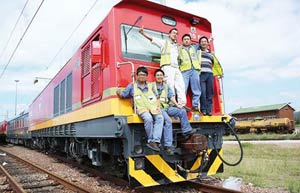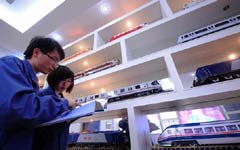To ensure product safety and durability, all trains need to be examined and maintained every day and sent for large-scale overhaul services after the running period of one year, five and 10 years, respectively.
The world rail and transit industry was worth $188 billion in 2013, with maintenance services accounting for half that figure, according to a report published by the United Nations Industrial Development Organization in March.
|
 |
 |
Thanks to the localization strategy, CSR ZELC received an order for 18 metro engineering maintenance vehicles through the bidding purchase project from the Land Transport Authority of Singapore in 2013.
Delivery will start in November. The vehicles will serve the west extension of Singapore urban rail transport network east-west line of Tuas and the engineering maintenance of Thomson line to guarantee normal operation of the lines.
Xu Bo, CSR ZELC's regional manager for Malaysia, recalled the biggest challenge for himself and the team last year occurred during the 2013 Malaysian general election period.
All trains developed by China CSR provided a 72-hour continuous services as required and extended 120 kilometers from the original running route to penetrate into electoral districts in the north.
"To respond to the local demand, we came up with coping solutions under different circumstances, formulated contingency plans in advance, closely monitored the train state, coordinated and strengthened overhaul operations during the rush hours, and provided uninterrupted transport services from May 4 to 6," Xu said.
"The China-ASEAN economies will count on enhanced regional connectivity especially the rail transportation to stimulate trade and attract investment as the member countries seek decisive measures to improve regional economic integration," said Zhao Jian, a professor of rail transportation at Beijing Jiaotong University.
Indeed, improving rail infrastructure could have meaningful economic implications because it comes at a critical time, when the world is counting on emerging markets to revive the global economy.
Zhao said Singapore and Malaysia's ongoing plan of building a high-speed rail link can further fuel the hope that Southeast Asia could one day have a similar European-style train system connected to China's Yunnan province or Guangxi Zhuang autonomous region in the future.
With an eager eye on future orders, Zhou, from CSR ZELC, predicted that ASEAN countries would need 1,100 new cars and refurbishment service for another 700 in the next five years, and its new ASEAN rail center in Malaysia will give the company an advantage to tap further into this lucrative market.
